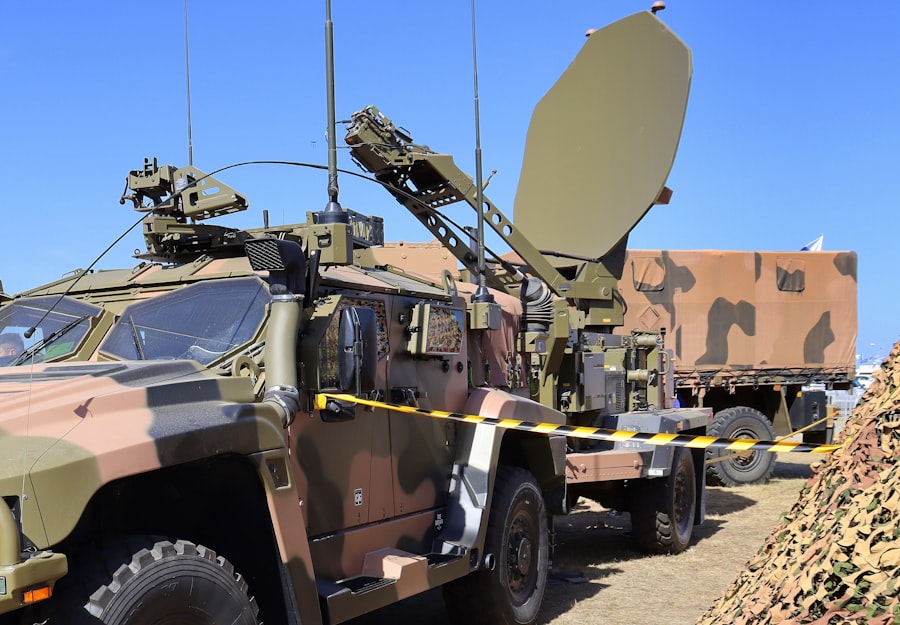In recent years, the digital transformation of military logistics has become a focal point for defense organizations worldwide.
However, this digitalization comes with a host of risks that must be carefully managed.
The reliance on interconnected systems and networks increases vulnerability to cyber threats, which can compromise sensitive information and disrupt critical supply chains. As military logistics become more sophisticated, understanding these risks is paramount for ensuring operational readiness and national security. Moreover, the complexity of modern military logistics systems means that a single point of failure can have cascading effects.
The potential for adversaries to exploit these vulnerabilities underscores the need for a comprehensive risk assessment framework. By identifying and analyzing the various risks associated with digital logistics, military organizations can develop strategies to mitigate them effectively, ensuring that their operations remain secure and efficient.
Key Takeaways
- Military logistics digitalization brings new cybersecurity risks
- Potential cybersecurity threats must be identified and addressed
- Secure communication channels need to be implemented
- Data integrity and authenticity must be ensured
- Personnel should be trained on cybersecurity best practices
Identifying Potential Cybersecurity Threats
The landscape of cybersecurity threats is constantly evolving, particularly in the context of military logistics. Cyber adversaries employ a range of tactics, from phishing attacks to sophisticated malware designed to infiltrate critical systems. One of the most pressing concerns is the rise of state-sponsored cyber warfare, where nation-states leverage cyber capabilities to disrupt or sabotage military operations.
This threat is compounded by the increasing interconnectivity of logistics networks, which can create multiple entry points for attackers seeking to exploit vulnerabilities. In addition to external threats, insider risks also pose significant challenges. Personnel with access to sensitive information may inadvertently or maliciously compromise security protocols.
This duality of threats—external and internal—necessitates a robust approach to cybersecurity that encompasses not only technological defenses but also human factors. By fostering a culture of security awareness and vigilance among personnel, military organizations can better safeguard their logistics operations against potential breaches.
Implementing Secure Communication Channels

Effective communication is vital for the success of military logistics, yet it is also a prime target for cyber threats. To protect sensitive information during transmission, military organizations must implement secure communication channels that utilize encryption and other protective measures. Secure communication protocols ensure that data exchanged between various stakeholders—such as suppliers, transport units, and command centers—remains confidential and tamper-proof.
This is particularly important in high-stakes environments where timely and accurate information is crucial for decision-making. Furthermore, the implementation of secure communication channels should extend beyond traditional methods. Emerging technologies such as secure messaging applications and virtual private networks (VPNs) can enhance communication security while maintaining operational efficiency.
By adopting a multi-layered approach to secure communications, military logistics can minimize the risk of interception or unauthorized access, thereby safeguarding critical information from potential adversaries.
Ensuring Data Integrity and Authenticity
| Metrics | Targets | Current Status |
|---|---|---|
| Data Accuracy | 99% | 98% |
| Data Completeness | 95% | 92% |
| Data Consistency | 98% | 97% |
| Data Authenticity | 100% | 99% |
Data integrity and authenticity are cornerstones of effective military logistics management. The accuracy and reliability of data directly impact decision-making processes and operational outcomes. In a digital environment, ensuring that data remains unaltered and authentic is a significant challenge, especially in the face of cyber threats that seek to manipulate or corrupt information.
To address this issue, military organizations must implement robust data validation mechanisms that verify the integrity of information at every stage of its lifecycle. One effective strategy for ensuring data integrity is the use of digital signatures and cryptographic techniques. These methods provide a means to authenticate data sources and confirm that information has not been tampered with during transmission or storage.
Additionally, regular audits and checks can help identify discrepancies or anomalies in data sets, allowing for timely corrective actions. By prioritizing data integrity and authenticity, military logistics can enhance operational reliability and maintain trust in their information systems.
Training Personnel on Cybersecurity Best Practices
Human factors play a critical role in the overall cybersecurity posture of military logistics operations. Even the most advanced technological defenses can be undermined by human error or negligence. Therefore, training personnel on cybersecurity best practices is essential for creating a resilient workforce capable of recognizing and responding to potential threats.
Comprehensive training programs should cover topics such as phishing awareness, password management, and safe browsing habits to equip personnel with the knowledge needed to navigate the digital landscape securely. Moreover, ongoing training initiatives are crucial in keeping personnel informed about emerging threats and evolving cybersecurity protocols. Regular workshops, simulations, and refresher courses can reinforce best practices and foster a culture of security awareness within military organizations.
By investing in personnel training, military logistics can significantly reduce the likelihood of successful cyber attacks while empowering individuals to take an active role in safeguarding their operations.
Establishing Redundant Systems for Critical Operations

In the realm of military logistics, redundancy is a key principle that enhances resilience against disruptions caused by cyber attacks or system failures. Establishing redundant systems ensures that critical operations can continue even in the face of unexpected challenges. This may involve creating backup systems for data storage, communication channels, and supply chain management processes.
By diversifying resources and capabilities, military organizations can mitigate the impact of potential cyber incidents on their logistics operations. Additionally, redundancy should not be limited to technological solutions; it should also encompass personnel and operational strategies. Cross-training staff members on multiple roles within logistics operations can provide flexibility in response to personnel shortages or system outages.
By fostering a culture of adaptability and preparedness, military logistics can enhance their ability to respond effectively to cyber threats while maintaining mission readiness.
Conducting Regular Vulnerability Assessments
Regular vulnerability assessments are essential for identifying weaknesses within military logistics systems before they can be exploited by cyber adversaries. These assessments involve systematic evaluations of hardware, software, and network configurations to uncover potential vulnerabilities that could compromise security. By conducting thorough assessments on a routine basis, military organizations can stay ahead of emerging threats and implement necessary mitigations proactively.
Moreover, vulnerability assessments should be complemented by penetration testing—an approach that simulates real-world cyber attacks to evaluate the effectiveness of existing security measures. This proactive stance allows organizations to identify gaps in their defenses and prioritize remediation efforts accordingly. By integrating regular vulnerability assessments into their cybersecurity strategy, military logistics can enhance their overall resilience against cyber threats while ensuring operational continuity.
Developing Contingency Plans for Cyber Attacks
Despite best efforts to secure military logistics operations against cyber threats, the possibility of an attack remains ever-present. Therefore, developing comprehensive contingency plans is crucial for ensuring that organizations are prepared to respond effectively in the event of a cyber incident. These plans should outline clear protocols for incident detection, response, recovery, and communication with stakeholders.
A well-structured contingency plan not only minimizes the impact of a cyber attack but also facilitates a swift return to normal operations. It should include designated roles and responsibilities for personnel involved in incident response efforts, as well as predefined communication channels for disseminating information both internally and externally. By proactively planning for potential cyber incidents, military logistics can enhance their resilience while maintaining operational integrity.
Collaborating with Industry Partners for Cybersecurity Solutions
Collaboration with industry partners is essential for enhancing cybersecurity capabilities within military logistics operations. The rapidly evolving nature of cyber threats necessitates a collective approach to developing effective solutions that address shared challenges. By partnering with technology providers, cybersecurity firms, and academic institutions, military organizations can leverage external expertise and resources to bolster their defenses.
Such collaborations can take various forms, including joint research initiatives, information sharing agreements, and participation in industry forums focused on cybersecurity best practices. By fostering an ecosystem of collaboration, military logistics can stay informed about emerging threats while gaining access to innovative technologies that enhance their security posture. This collaborative approach not only strengthens individual organizations but also contributes to the overall resilience of national defense systems.
Incorporating Blockchain Technology for Secure Data Management
Blockchain technology has emerged as a promising solution for enhancing data security within military logistics operations. Its decentralized nature ensures that data is stored across multiple nodes rather than relying on a single point of failure, making it inherently resistant to tampering or unauthorized access. By incorporating blockchain into logistics management systems, military organizations can enhance data integrity while providing transparent audit trails for critical transactions.
Furthermore, blockchain technology facilitates secure sharing of information among various stakeholders involved in military logistics operations. Smart contracts—self-executing contracts with predefined conditions—can automate processes such as procurement and inventory management while ensuring compliance with security protocols. By leveraging blockchain technology for secure data management, military logistics can enhance operational efficiency while safeguarding sensitive information from potential cyber threats.
Adhering to Regulatory Compliance and Standards
Adhering to regulatory compliance and established standards is fundamental for maintaining cybersecurity within military logistics operations. Various frameworks exist—such as the National Institute of Standards and Technology (NIST) Cybersecurity Framework—that provide guidelines for managing cybersecurity risks effectively. Compliance with these standards not only enhances security but also demonstrates accountability to stakeholders and regulatory bodies.
Moreover, staying abreast of evolving regulations ensures that military organizations remain proactive in addressing emerging threats while aligning their practices with industry best standards. Regular audits and assessments against compliance requirements can help identify areas for improvement while reinforcing a culture of accountability within organizations. By prioritizing regulatory compliance and standards adherence, military logistics can strengthen their cybersecurity posture while fostering trust among stakeholders in their commitment to safeguarding sensitive information.
In the rapidly evolving landscape of military logistics, the digitalization of supply chains presents both opportunities and risks. As armed forces increasingly rely on digital systems to enhance efficiency and responsiveness, they also face heightened vulnerabilities to cyber threats and data breaches. An insightful article on this topic can be found on




